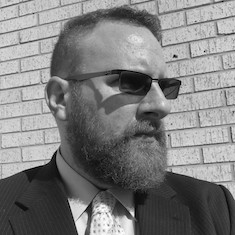Building a Smart City is a challenging task... just ask Brent Messer, the CIO of Chattanooga, TN – 1 of only 2 US cities to be selected for the Global Smart City Alliance.
Brent is an award-winning, entrepreneurial-minded change agent who is helping to lead the smart city initiatives being introduced in the ‘Gig City’ and that will help to transform people’s lives.
Ahead of his panel discussion at Public Sector Network’s 'Architecting the Future of your Smart City' Virtual Event this March – we sat down with Brent to explore his career in public service, where smart city development is headed, and the impact of COVID-19 on his work – among other things.

Q1:
2020 was quite the year. Can you share with us a perspective and/or a lesson learned, that you didn’t have on January 1st, 2020 – but that you hold today?
A1:
Well, I am sure we can all agree that this pandemic has undoubtedly given us all a new perspective of how fragile life is. Thankfully we were prepared and in a good position to get our non-frontline staff working from home within just two days when it first hit. But this past year has also helped us to reiterate why we push to innovate and implement mobile and smart cities technology. It has opened a lot of people’s eyes, including our skeptics, about the value these technologies provide when utilized and planned correctly. It has changed my perspective slightly in that it has opened up more avenues for smart cities tech - or any tech for that matter. Prior to the pandemic, public touch screens and other such contact-based human/computer interfaces were the norms. January 2020 I didn’t think anything of it. Today I look at these interfaces and think; how can we make this touch-free and safer but still keep the personal interactivity we crave as humans? The lesson learned for a lot of folks, especially in government, is how critically important IT is for organizations’ operations.

Q2:
As a ‘Google City’ and one of only two American cities to join the Smart City Alliance as of January 2021; Chattanooga has been a leader in technological development and smart city-related initiatives. Where has the impetus come from to position yourselves in that way? How do you sustain continued innovation – especially during such challenging times?
A2:
Culture! Well from an IT perspective our motto is Semper Novandi, meaning Always Innovating. The impetus coming from changing and challenging the status quo. Chattanooga has a different culture when it comes to innovating in government (words that used to be oxymorons). Whereas traditional government agencies look at innovation as the slow evolvement of technological capabilities and generally focused on traditional internal processes (e.g. finance and ERP systems, etc), Chattanooga looks not to maintain any status quo, but rather ask the questions how can we improve, become faster, smarter, and provide citizens more value.
I think we Chattanoogan’s have a bit of a competitive streak in us as well. Think about it this way - from a business perspective. Yes, local governments help regulate, protect, serve citizens in a variety of operational and legislative ways. But would one say a local government as Chattanooga competes like one sandwich shop competes for market share with the other sandwich shop (which shall remain nameless)? Not in the same sense, but in a way... we do. It’s a friendly competition with other local governments - cities and counties from (quite literally) all over the world. We have a name for it and it’s called economic development. Chattanooga has many, many large corporations here that manufacture and distribute goods; an example is Volkswagen. We did compete to get the new Atlas (and now more) assembled in Chattanooga, which brings jobs and revenue. That revenue can therefore be used to make our city smarter, faster, more efficient, and (most importantly) more attractive to other businesses - especially now after the COVID-19 surges. Remote working is here to stay It's cost-effective, and if you can work from home, why live in Seattle, Los Angeles, NYC, etc? It happening right now and I’ve watched as houses all around me have sold for thousands above what they are worth with people moving here from other places - because of the culture and greatness that is Chattanooga.
Q3:
With so many varied programs and initiatives currently being pursued; from the smart grid to automated vehicles, from automation within garbage collection to a smart traffic system - what initiative would you point to as being a major game-changer for the majority of your citizens? What should Chattanoogans look forward to?

A3:
There are so many ways we can improve and transform our city to be even smarter. Touch-free ways to interact for one small in scope, but now very relevant probably for the foreseeable future. Then again, that’s not really a game-changer. I think that would be our citizen user-centric system currently dubbed the My Chattanooga Experience. And yes, it is an experience and a system. In Chattanooga, we love data. We have one of - if not the largest - collection of open data in the country. But I think our concept of centralized resources for citizens will be a big game-changer for the city; and will open new doors and possibilities for more smart-city technologies and interactions.
Q4:
We've discussed technology quite a bit so far – but as a leader, your focus is also on people, culture, and getting the best out of your team. How do you approach getting their buy-in and engagement as it pertains to advancing city-wide initiatives?
A4:
As a leader, really my staff don’t work for me... I work for them! Part of my job is to knock down barriers and roadblocks to success for them: Create and maintain the most comfortable and stress-free working environment as possible; Provide a culture that invites people to think and speak freely; Solve problems that might otherwise go unnoticed; Build a culture of trust and treating employees like grown adults who can and want to do the job correctly; and allow our staff to be free to find solutions to problems or rethink ideas (a traditionally private sector mentality).
My staff, for example, have worked remotely for years, or from wherever they felt like working (coffee shop, long working lunch, etc). They don’t really have a “chain of command” for communications. Leaving communications in silos and requiring staff to speak to a supervisor, then the supervisor takes it to the manager, then the manager takes it to the director, then the deputy, then the department head, etc. - that stifles creativity, kills morale, and is the traditional bureaucratic mentality that prevents innovation. The private sector has known this for many years. If my staff have an idea, they can come directly to me. If they need to speak to another department head or the COO or even the Mayor regarding ideas, projects, etc. Go tell them directly. No telephone game. My permission is not needed. Again, treat people like adults and trust then stand back and watch the productivity and creativity fly. Also, failure is an option. Look, a project fails for a variety of reasons and when one is really costly it makes headlines. as “waste” or “mismanagement.” The staff that works in great environments are more diligent and usually much more successful.
There are those skeptics of my methods that say some employees will take advantage of that method and must be fully supervised at all hours, etc, etc. Yes, there are always going to be bad eggs (so-to-speak), but you will quickly find out who they are and weed them out. You and the other staff know who is not pulling their weight. Hire the best and surround yourself with the smartest people you can find, and they will take care of the rest. A-People will hire A-People. B-People hire C-people and C-people hire real duds. Check your ego at the door, and don’t wear your rank around like a badge of honor or an intimidation tool. Know when to step in and more importantly - when to back off. Do this, and you will see these environments and working cultures thrive. If you see a stifled or “don’t rock the boat” environment it’s usually because of bad managers, poor leadership, or both. These are not new concepts or groundbreaking methods - they're really just common sense... and they work.
There is another thing that happens when you create this environment. The long thought idea that government is inefficient, lazy, and wasteful starts to go away. A bad environment creates that poor morale where an employee doesn’t want to look for things to change, especially if they are going to get chastised for finding changes even if it produces savings for taxpayers. My staff has the freedom to enact change and innovate, and as a result, we have saved Chattanooga taxpayers over $3.3 million dollars a year. Those are real tangible savings that can go to making our city that much smarter!
Q5:
Pulling out your magic 8-ball – Where do you see Chattanooga’s smart city development in 10 years?
A5:
Chattanooga is a very progressive city with a rich heritage of firsts. I would say that in ten years' time we will have more automation of our infrastructure, better data collection, more centralized data to help with further enhancing our smart cities efforts, more use of artificial intelligence and machine learning to identify and repair our roads, and overall a much better engagement and experience with conducting business with the City. I’d really like to see automated self-driving cars live, too.

Q6:
Brent – you’ve been involved in public service for a significant portion of your career. What drew you to public service, and what would you say to the next generation of public sector leaders and those currently considering a career in public service?
A6:
I come from a family of civil servants so you can say it’s sort of in my DNA, but I am truly drawn to it because I like involving myself in the community. Good civil servants are not in it for the money and we will never get rich doing what we do. My staff and I do it because we care and we live here. I’m a taxpayer too, so I want to see money saved and ensure it goes to good use. It allows me to sleep well at night, proud that we have helped make our community a better place. That’s another takeaway from your previous question regarding culture - find passionate, selfless people to hire and work with.
For those wanting to get into this line of work, especially in technology, I highly suggest that you read my book when it is published (LOL). That’s first! Then make sure you really want to do this. It’s not glamorous; you won’t get rich, it is a LOT of hard work and with minimal budgets. Sometimes you will be handed a hammer and some nails and asked to build a skyscraper. So know that you will have to manage expectations. Be prepared to face some challenges you don’t have in the private sector. If you are a good communicator, you will go far. If you are not, well, best start brushing up on that one before trying the public sector in leadership roles. It’s good to have thick skin too. Then check your ego at the door and work for your employees and citizens. That sounds easy, but it’s not. Start practicing now and it will take you a long way in improving your community. If you truly do have a passion for being a public servant, then do it. Be proud, do well, and sleep well at night. And remember, you are a public servant. You work for the citizens and what you do is public for the most part. Be honest! Be as transparent as possible.




















